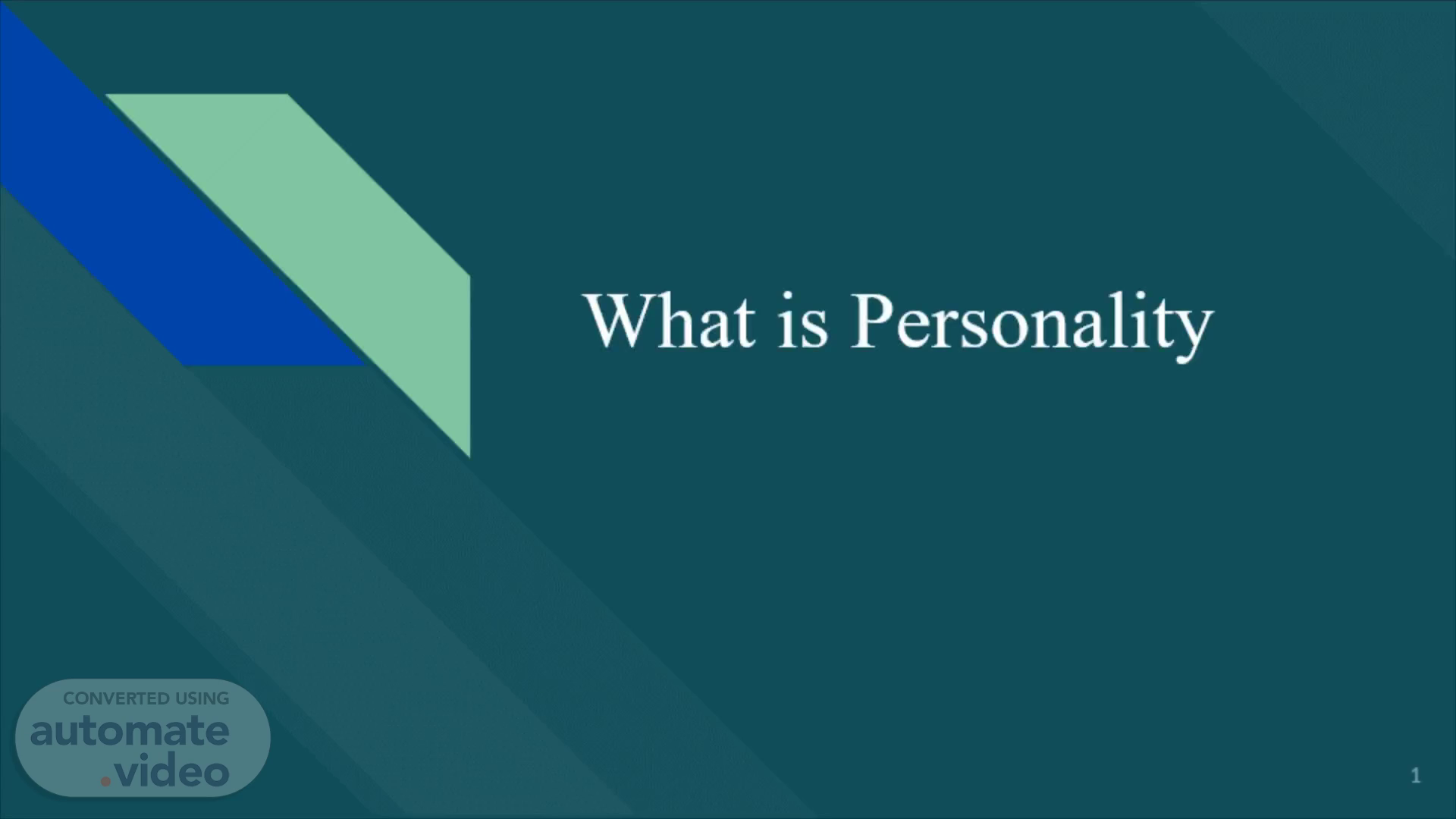
What is Personality
Scene 1 (0s)
[Audio] We are group three and we will be presenting on the topic Personality..
Scene 2 (11s)
Table of content. Introduction What is personality Major theories of personality The big 5 personality traits How is personality measured.
Scene 3 (21s)
[Audio] The objective of this presentation is to will examine the definition of personality and its underlying components. The term personality will be defined, along with its connected theories and their respective examples. We will also cover how personality is measured, the five personality types, and a prominent personality-focused psychologist..
Scene 4 (44s)
[Audio] Personality can be define as the The distinctive thought, feeling, and behavior patterns that define a person's personality are what set them apart from others. It is believed that personality develops from within and largely holds steady throughout life. Our descriptions of other people's characteristics can serve as examples of personality..
Scene 5 (1m 7s)
[Audio] To better understand personality different psychologist delevop theories to explain what they believe personality is. The five major theories of personality psychology are: Biological, Behavioural , Psychodynamic, Humanistic and Trait Theories.
Scene 6 (1m 26s)
[Audio] The Biological Theory contend that personality is determined by heredity and support nature in the traditional nature vs nurture dispute. They study twins to determine which qualities are tied to heredity and which are linked to environmental influences..
Scene 7 (1m 52s)
[Audio] Behavioural Theories however believes that personality develops as a result of interactions between the individual and the environment. They examine internal thoughts, moods, and feelings because these cannot be assessed. B F Skinner and John B. Watson are popular behavioral theorist..
Scene 8 (2m 14s)
[Audio] The third personality theories will be discussing is the Psychodynamic Theories. Sigmund Freud came up with this theory which looks at the influence of the unconscious mind and childhood experiences on personality. Erik Erikson agreed with freuds work and came up with the psychosocial development that states personality evolved through a series of stages, with certain conflicts arising at each stage..
Scene 9 (2m 48s)
[Audio] The Humanistic theory is another theory of personality. They emphasize the importance of free will and individual experience in personality formation. Carl Rogers and Abraham Maslow are two popurlay humanistic theorist..
Scene 10 (3m 13s)
[Audio] Last but not least we the Trait Theories. They belelive that personality is made up of a variety of broad traits. Trait is befined by them as a reasonably stable attribute that leads a person to behave in specific ways. It is the psychological " blueprint" that guides behavioral tendencies which inflencese personality..
Scene 11 (3m 38s)
[Audio] We will now look at the five the personality traits of according to personality theorists. They are normally referred to as the big five and this video will explain them..
Scene 12 (5m 0s)
[Audio] Another aspect of personality is how it is measured. They are four main methods used for measuring the personality of an individual. The methods are: Subjective Methods which utilizes Observation, Case Study and Interview; the Objective Methods that uses rating Scales, Checklists and Controlled Observation; the third one is Projective Methods, and they utilize Projective Techniques, Rorschach Inkblot Test and Thematic Apperception Test ( TAT); the fourth and final one is the Psycho-Analytic Methods that uses Word Association Tests, Free Association Tests and Dream Analysis..
Scene 13 (5m 43s)
Subjective Methods. Observation Case Study Method Interview.
Scene 14 (5m 57s)
[Audio] Now let us look at how personality as impact the field of Psychology. Personality psychology focuses on understanding individual variability in people's thoughts, feelings, and behaviors: why is one person shy and another sociable, one person irritable and another even-tempered, and one person reliable and another irresponsible? One of the hallmarks of the field is that such questions are investigated at multiple levels of analysis, from genes to sociocultural contexts.
Scene 15 (6m 31s)
[Audio] Now we will be looking at a noteworthy psychologist who is rooted in the field of personality. Sigmund Freud is this psychologist and I am sure we are all familiar with him. His Notion of personality evolved as he advanced in his theoretical growth. He believed human personality emerges from the conflict between our destructive tendencies and our desire for pleasure. To understand personality, Freud proposed five models: topographic, dynamic, economic, genetic, and structural. These models were meant to build a full framework in which each of our personalities might be defined.
Scene 16 (7m 14s)
[Audio] Lastly is a case on Personality. This case study demonstrates how a child's personality develops from childhood to adulthood and how it influences their life choices as their personality triats..
Scene 17 (8m 7s)
[Audio] We have come to the end this presentation we hope you have a better understanding of the term personality..
Scene 18 (8m 33s)
Reference. Cherry. (2022, October 18). Personality Psychology (T. Lockhart, Ed.). Verywell Mind. https://www.verywellmind.com/personality-psychology-4157179 Cherry. (2022, August 29). Theories and Terminology of Personality Psychology (Chung, Ed.). Verywell Mind. https://www.verywellmind.com/personality-psychology-study-guide-2795699 Daisha, M. (2016, November 3). Measurement of Personality: 4 Methods | Statistics . Your Article Library. https://www.yourarticlelibrary.com/statistics-2/measurement-of-personality-4-methods-statistics/92641 Sprouts. (2019, November 7). The Big Five Personality Traits [Video]. YouTube. https://youtu.be/IB1FVbo8TSs.